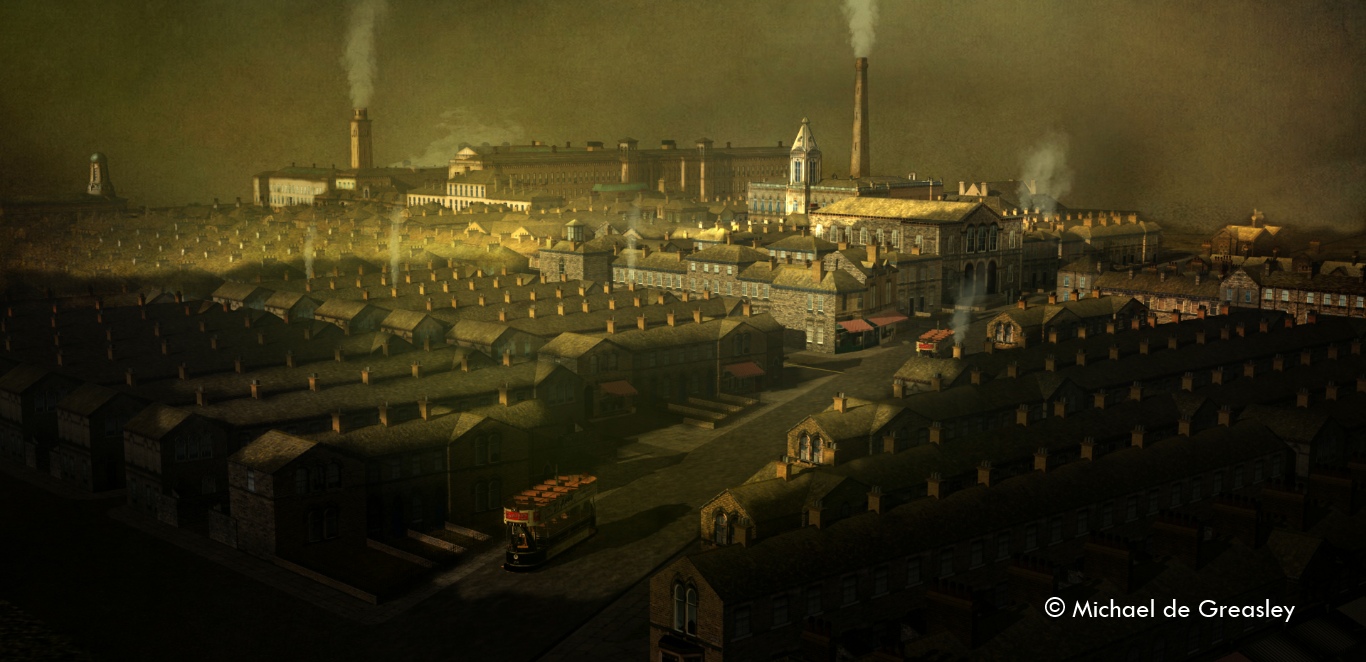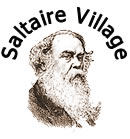Bradford Mills at Marki, Poland: ‘A Second Edition of Saltaire’
By Sarah Dietz
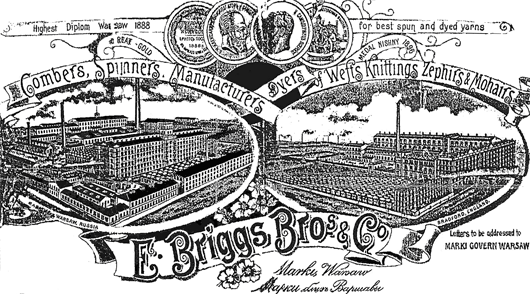
Early twentieth century letter head for the Marki firm
by kind permission of the Urząd Miasta Marki
In 1883, Edward Briggs, a Bradford worsted manufacturer, purchased a 75 acre estate at Marki outside Warsaw. Where, with blueprints drawn up in Bradford, under the supervision of the Polish architect Edward Lilpop, he built a huge state of the art worsted mill and model workers’ community which would later be described as ‘a Second Edition of Saltaire’. [Footnote 1] While construction was underway Briggs recruited a hundred Polish girls and, provided with decent clothes and shoes, he shipped them to England to learn factory skills.
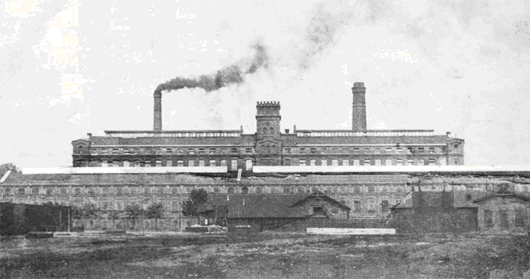
Bradford Mills at Marki by kind permission of Ralph Haigh
At the end of the nineteenth century foreign investment was fashionable. Individuals and companies increasingly bought foreign railway stocks, government bonds, mining companies and colonial plantations. In fact, between 1870 and 1913 about a third of all British investment was in foreign assets. [Footnote 2] However, building a factory abroad with community housing, shops and a school like Saltaire, was extremely rare, costly and commercially risky.
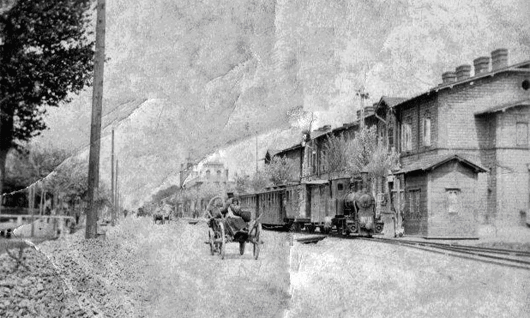
Marki’s main street circa 1910, by kind permission of Ralph Haigh
Edward Briggs, of Briggella Mills in Bradford, was joined in his bold foreign enterprise by Ernst Posselt. Born in Heidelberg, this naturalised Briton and long resident of Shipley ran an international network of merchant and manufacturing firms from his office in Little Germany. With the two youngest Briggs brothers, John and Alfred, it was Posselt who relocated to Warsaw and established the new firm, known as Briggs & Posselt Co., Marki until 1897 and thereafter as E. Briggs Bros & Co., Marki.
The opportunity that the Briggs-Posselt partnership recognised in Poland was not cheap land, labour or the lack of factory legislation abroad, although these were significant side benefits, but escape from fierce domestic competition and a huge unexploited market for worsted yarn and cloth in the Russian empire. But like Titus Salt, Briggs also claimed the need to find new openings for younger members of his family.
By 1883 eastern Poland, was one of the most rapidly industrialising and profitable regions of the Russian Empire but its mainstay was cotton; indeed Łódź was known as the Manchester of Poland. All worsted was imported, mostly from Germany or France, and at great cost as the Russian government drove up import taxes. But worsted was an almost universal product, in demand for military investment in uniforms and ideal for existing Polish and Russian cotton or woollen manufacturers to extend their product range and copy Bradford’s typical mixed or lustre qualities.
Each year the Bradford partners joined Warsaw’s Tsarist president General Sokrates Starynkiewicz on the select committee of the Warsaw Wool Fair. But the Marki firm’s success was built not just on a virtual worsted monopoly but by the venture capitalists’ shrewd social networking in Warsaw. John and Alfred Briggs made prestigious marriages into Warsaw’s commercial elite and thus broadened their interests into tanning and railways. At the turn of the century their nephew, Charles Whitehead, joined the firm and his marriage to Eleanora Wedel, daughter of the Warsaw chocolate magnate E. Wedel, provided the expatriate worsted manufacturers with a longstanding contract for dairy supply from their estate lands.
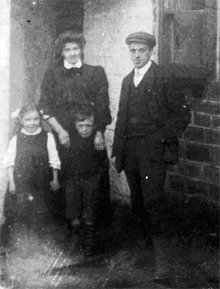 |
|
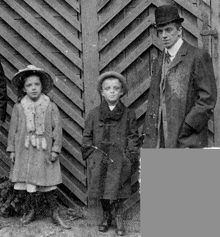 |
| Electrical engineer John Hinchcliffe with his family in Bradford circa 1908. |
A significantly wealthier- looking Hinchcliffe with his children in Poland in 1910. |
| Mouse over images to enlarge |
In 1898 the Yorkshire Weekly Post described the Marki venture as ‘English foremen, English machinery and English business methods’[Footnote 3] and the British consul’s Warsaw dispatches and Polish press are peppered with the names of Yorkshire families who moved to Poland before the Second World War to improve their fortunes: Briggs, Bottomley, Cullen, Firth, Gray, Haigh, Hinchcliffe, Holroyd, Illingworth, Kellett, Miller, Rice, Ringstedt, Shackleton, Thackray and Whitehead among many more, worked not just in Marki but also in Łódź and the great linen mills of Żyrardów.
The fascinating history of the Briggs-Posselt partnership’s Polish enterprise reveals not only a case of extraordinary entrepreneurial skill and vision, but the longstanding social and economic relations between Britain and Poland which existed long before the Second World War.
© 2013 Sarah Dietz All Rights Reserved
Note from Sarah Dietz
Do you have relatives who worked at Marki, or elsewhere in the textile industry abroad before the war? I would be really interested to hear from you at: sarah.dietz@haigh.free-online.co.uk
Related articles:
Footnotes
1. Illustrated Weekly Telegraph, Bradford, 19 March 1886.
2. M. Dintenfass, The Decline of Industrial Britain 1870-1980 (London: Routledge,1992), p. 40 and A. Cairncross, Home and Foreign Investment, 1870 – 1913 (Cambridge: Cambridge University Press, 1953), p. 4,
3. Yorkshire Weekly Post, Bradford, 12 March 1898.
DOWNLOAD AND PRINT THIS ARTICLE
Download this article as an Acrobat document >
ACROBAT READER
You willl need Acrobat Reader installed on your computer.
If you don't have Acrobat Reader, you can download the software FREE.
 GET ACROBAT READER - FREE! GET ACROBAT READER - FREE!
|
